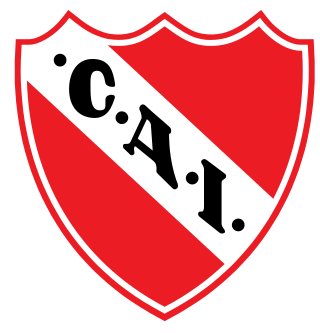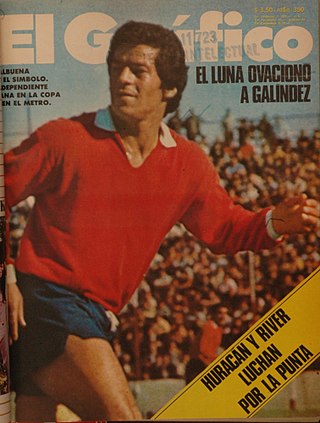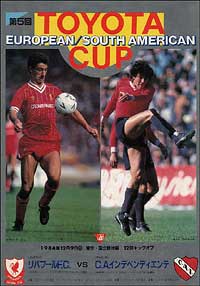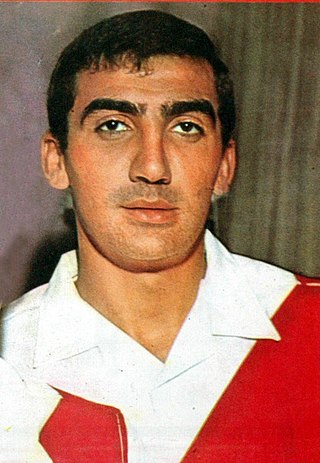The Intercontinental Cup, officially the European/South American Cup and known from 1980 as the Toyota Cup for sponsorship reasons, was an international football competition endorsed by UEFA (Europe) and CONMEBOL, contested between representative clubs from these confederations, usually the winners of the UEFA Champions League and the South American Copa Libertadores. It ran from 1960 to 2004, when it was succeeded by the FIFA Club World Cup, although they both ran concurrently in 2000.

Carlos Alberto Tevez is an Argentine professional football manager and former player. A quick, tenacious, powerful, hard-working and dynamic forward in his prime, Tevez was capable of playing as a striker, as a winger, as a supporting forward, or as an attacking midfielder. He was most recently the head coach of Primera División club Independiente.

Club Atlético Independiente is an Argentine professional sports club, which has its headquarters and stadium in Avellaneda, a city of the Buenos Aires Province. The club is best known for its football team, which plays in the Primera División and is considered one of Argentina's Big Five football clubs.

Ricardo Enrique Bochini is an Argentine former professional footballer who played as an attacking midfielder. He is nicknamed El Bocha. He spent his nearly twenty-year professional career at club Independiente, becoming one of the most emblematic players and the greatest idol in the history of the club. Bochini was a childhood idol of Argentine iconic footballer Diego Maradona.

Ricardo Elvio Pavoni Cúneo is a Uruguayan former football defender who played the majority of his career for Club Atlético Independiente in the Argentine First Division.

The Estadio Libertadores de América - Ricardo Enrique Bochini is a stadium located in the district of Avellaneda in Greater Buenos Aires, Argentina. Owned by Club Atlético Independiente, the stadium host the home matches of club's football team. The stadium was officially named only as recently as 2005, having been previously known simply as Estadio de Independiente or La Doble Visera de Cemento because of the two roofs overhanging the spectators.

Ricardo Omar Giusti is an Argentine former footballer. A midfielder, he played most of his career with Argentine side Independiente. At international level, he won the FIFA World Cup with Argentina in 1986 and was also a member of the runner-up national squad in the 1990 edition of the tournament. With 53 caps between 1983 and 1990, Giusti is currently 38th in the appearance records for the Argentina national football team. He played a part in five major tournaments for his nation.

Humberto Dionisio Maschio was an Argentine-Italian football player and manager who played as a forward or midfielder.

Ricardo Daniel Bertoni is an Argentine former footballer who played as a right or left winger. In Argentina, he had a successful career at Club Atlético Independiente, where he won three Copa Libertadores, one Intercontinental Cup and three Copa Interamericana trophies.

Rubén Galván was an Argentine football who played as a midfielder for Club Atlético Independiente for most of his career. At international level, he was part of the Argentina squad that won the 1978 FIFA World Cup on home soil.

The Avellaneda derby is the second-most important rivalry in Argentine football. It is contested between Independiente and Racing Club.
This page details the records and statistics of the Copa Libertadores. The Copa Libertadores is an international premier club tournament played annually by the top football clubs of South America. It includes 3–5 teams from all ten CONMEBOL members. It is usually held from January to November.

Agustín Alberto Balbuena was an Argentine football striker who won four Copa Libertadores and one Intercontinental Cup with Club Atlético Independiente.

The 1985 Intercontinental Cup was an Association football match played on 8 December 1985, between Juventus, winners of the 1984–85 European Cup, and Argentinos Juniors, winners of the 1985 Copa Libertadores. Recognised as the best edition in the history of the tournament for technical and agonistic level, the match was played at the National Stadium in Tokyo. It was Juventus' second appearance into the competition, after replacing Ajax in 1973.

The 1995 Intercontinental Cup was an association football match played on 28 November 1995 between Ajax, winners of the 1994–95 UEFA Champions League, and Grêmio, winners of the 1995 Copa Libertadores. The match was played at the National Stadium in Tokyo. It was Ajax's second appearance into the competition, after the victory in 1972; moreover, Ajax declined to play in 1971 and 1973, being replaced by Panathinaikos and Juventus respectively. It was Grêmio's second appearance as well, after the victory in 1983.

The 1984 Intercontinental Cup was an association football match between Liverpool of England and Independiente of Argentina on 9 December 1984 at the National Stadium in Tokyo, Japan, the annual Intercontinental Cup contested between the winners of the Copa Libertadores and European Cup. Independiente were appearing in their sixth Intercontinental Cup, they had won the competition once in 1973 and lost the other four. Liverpool was making their second appearance in the competition, after their loss in 1981.

The 1972 Intercontinental Cup was an association football tie held over two legs in September 1972 between the winners of the 1971–72 European Cup, Ajax, and the winners of the 1972 Copa Libertadores, Independiente.

Club Atlético Independiente has success at the Argentine football level, but they are widely known for their international titles and appearances, being nicknamed Rey de Copas by the media and his fans. The first international cup they took part was the 1917 Tie Cup, which they lost to Uruguayan team Montevideo Wanderers. In term of international honours, Independiente has won a total of 20 major titles, with 18 of them organised by CONMEBOL which makes Independiente the most winning team in this category, together with Boca Juniors. Among those international CONMEBOL titles Independiente has a record seven Copa Libertadores, two Intercontinental Cups, two Copa Sudamericana and one Recopa Sudamericana. International titles also include two Copa Aldao, organised by AFA and AUF together.

Miguel Angel Lopez, nicknamed Zurdo, is an Argentine former footballer and manager. As a player, López had his most successful tenure on Independiente, where he won eight titles.

Boca Juniors is an Argentine professional football club based in Buenos Aires. The club first participated in a South American competition in 1919. The first international cup they took part in was the Copa Aldao in which they participated as champions of Argentina. The club competed in AFA/AUF cups from 1919 to 1946 and since entering the Copa Libertadores, in 1963, the club has competed in every CONMEBOL-organized competition, except the Copa CONMEBOL, Intercontinental Champions' Supercup, Suruga Bank Championship, Copa Merconorte, Copa Master de CONMEBOL and Copa Ganadores de Copa, most of them extinct.




















